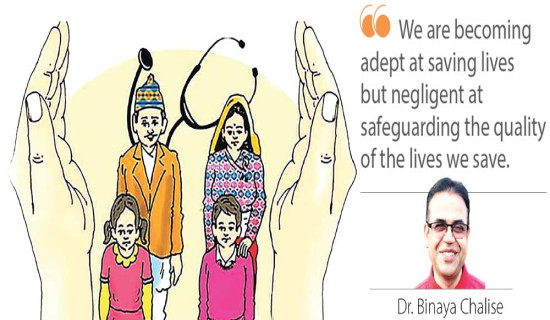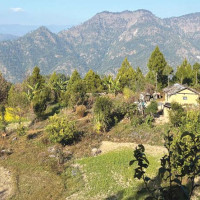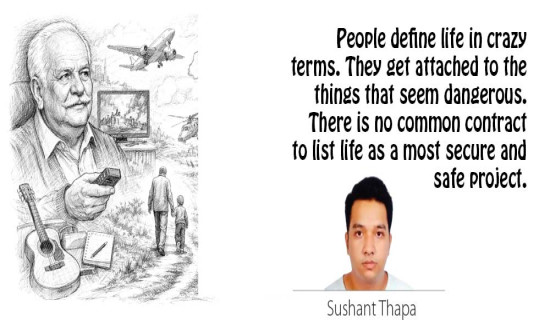- Friday, 30 January 2026
Nepali Students In Dilemma
Bibek Shah/DJ Shah
In Nepal, students after their high school education or their secondary education confront a difficult situation to make a decision. The options are many: whether to stay in the country by pursuing higher education and exploring career opportunities within the country or to leave Nepal in quest of better prospects. The latter appears more appealing as an option to the students. This is the reality of the hour. It is time to contemplate this grave issue of concern.
Capital Flight
In the first five months of the current fiscal year, students going abroad for foreign studies have taken Rs 29 billion in foreign currency out of country. According to Nepal Rastra Bank(NRB), those going for foreign studies from July to November have legally availed the exchange facility of Rs 28.81 billion.
The central bank of Nepal clearly shows through its data the growing trend of studying abroad where an exodus of people are leaving Nepal for study and foreign employment. The data is striking. This gives a grim picture of where we are heading. The exodus of migration is at an unprecedented rate and ratio. What will Nepal's future be like?
The question looms large amidst the chaos and confusion fueled by the erratic minds of young Nepalese. Nepalese students after high school come across the duality of choices. The transition from secondary education to high school and high school to higher education is a daunting task. It is rather akin to navigating a maze without a map. The choices and opportunities available to them are vast and varied but at the cost of high stakes. On several occasions, these students weaving dreams in their minds run out of aid or prop or guidance or counselling in their ability to make informed decisions. This is the time when students find themselves floundering in the sea of uncertainties and unpredictability.
In a deep analysis of this agenda, there are critical issues that come to the forefront. The root causes behind the current façade are multifaceted. One such cause stems from the lack of access to quality education. Another reason for the brain drain is the dearth of career counselling and guidance at home. Added to this, Nepal’s education providers are missing the mark to deepen the understanding and failing to train and empower students with the skills and credentials needed to vie in the competitive global job market. In the absence of lifelong education and skills, students are not able to make out of choices for better and brighter career prospects. The indecisiveness of students leads to a ‘’leaky pipeline’’ of talent and potential instigating them to go overseas. This is further lubricated by dropping out of higher education. The result is harsh- the students are unable to obtain qualifications and abilities that match the job market.
The problem is exacerbated by the limited economic prospects in Nepal. With a meagre GDP per capita, this leads to a lack of economic growth has led to widespread poverty making it harder for most students to continue their higher education. This lack of economic opportunities makes it difficult for students to find jobs and build a future for themselves, leading many to seek out greener pastures overseas.
For students who do choose to stay in Nepal and pursue higher education, the road ahead is not without its challenges. The high cost of tuition, coupled with the lack of financial aid and scholarship opportunities and the competitiveness of the job market, makes it difficult for students to find employment after graduation.
However, most of my fellow scholars dive into foreign shores for better prospects. This is a brain drain in its prime form. One of the most significant hurdles that scholars face in Nepal is the dearth of career opportunities followed by low pay and perks. The unemployment rate is stubbornly high, and competitiveness in job markets is highly in demand. This creates a ‘’Catch-22” situation where they are unable to secure a job without prior work experience, yet they are unable to do so without a job. This can lead to feelings of inadequacy and frustration, as students struggle to align their aspirations with the realities of academic life.
Critical Challenges
Nepal's education sector faces critical challenges. One such challenge is the failure to ensure full access to quality education for all. Another problem is the inability to ensure access to specially targeted groups of children to educational opportunities. Students very often drop out in the middle of their studies. It is imperative to maintain the continuity of enrolled students and achieve high learning outcomes. The government is not able to manage area-wise and subject-wise teachers in all schools. On top of all, schools and colleges fail to focus on technical education to prepare human resources for the future.
On the other hand, imparting technical and vocational education with skills development has been stressed in the constitutional obligation through the right to education. On the ground, the state is unable to focus on the production of human resources to support the knowledge-based economy. There is a need for making university education research-based. In one way, there is the lack of availability of human resources in line with market demand and in another way, the produced human resources are seeking employment but failing to get jobs as per their qualifications. Another hindrance is the absence of a reading culture and public library system for lifelong education. Guaranteeing good governance at all levels of the education sector has been a daunting task at a time when proper management of educational institutions of public and private investment is questionable and high rates of brain drain are on the rise.
The current needs include: enhancing attraction towards public education through universal access, development of proper infrastructure, equitable access and assurance of quality, enhancing educational good governance and accountability, teaching and learning process practical, child friendly and technology-based, preparing entrepreneurial, critical thinking and innovative citizens, enrolling all non-school going eligible children to schools, achieving expected learning outcomes by reducing class dropout rate to zero, ensuring availability and management of resources required for equitable access to physical infrastructure and technical human resource for development of technical education and vocational training, making the students graduating from all universities internationally competitive, realizing the new vision of promoting knowledge- and technology-based economy by expanding high-level technical education opportunities, enhancing good governance and accountability in education sector, creating opportunities for qualified youth to work within the country, timely restructuring of educational administration, mapping of educational institutions based on demographic structure, internal and external migration trends, and utilizing the various opportunities brought about by the development of information and communication technology.
Way Forward
The problems and challenges facing the education sector of Nepal can be dealt with through some concrete strategies. One strategy is to integrate technical subject areas such as agriculture and forestry, ecology, science and technology, medical science, Ayurveda, tourism, engineering, hydroelectricity, renewable energy, industry, and trade with higher education based on national priority and practical and employment-oriented higher education. This will be a catalyst to create an environment for keeping foreign-bound human resources within the country. Another strategy would be to align the curriculum and programme of higher education with national needs.
Overall, students in Nepal face a difficult decision dilemma after completing high school: whether to stay in the country or leave the country and risk being part of the brain drain. The country is in dire need of more investments in education and job markets to stop the mass migration of their talents and skills.
(DJ Shah works at the Ministry of Labour, Employment and Social Security and Bibek Shah is an independent researcher. )

















